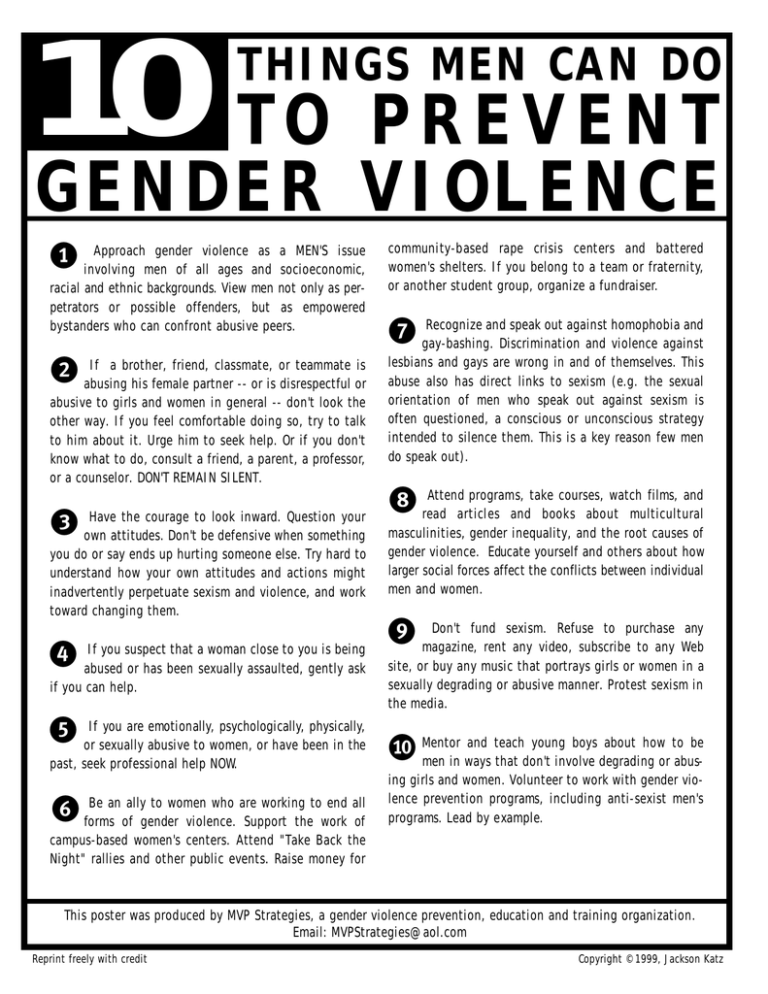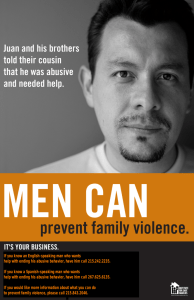
10 T O
THINGS MEN CAN DO
PREVENT
GENDER VIOLENCE
1
Approach gender violence as a MEN'S issue
involving men of all ages and socioeconomic,
racial and ethnic backgrounds. View men not only as perpetrators or possible offenders, but as empowered
bystanders who can confront abusive peers.
2
If a brother, friend, classmate, or teammate is
abusing his female partner -- or is disrespectful or
abusive to girls and women in general -- don't look the
other way. If you feel comfortable doing so, try to talk
to him about it. Urge him to seek help. Or if you don't
know what to do, consult a friend, a parent, a professor,
or a counselor. DON'T REMAIN SILENT.
3
Have the courage to look inward. Question your
own attitudes. Don't be defensive when something
you do or say ends up hurting someone else. Try hard to
understand how your own attitudes and actions might
inadvertently perpetuate sexism and violence, and work
toward changing them.
4
If you suspect that a woman close to you is being
abused or has been sexually assaulted, gently ask
if you can help.
5
If you are emotionally, psychologically, physically,
or sexually abusive to women, or have been in the
past, seek professional help NOW.
6
Be an ally to women who are working to end all
forms of gender violence. Support the work of
campus-based women's centers. Attend "Take Back the
Night" rallies and other public events. Raise money for
community-based rape crisis centers and battered
women's shelters. If you belong to a team or fraternity,
or another student group, organize a fundraiser.
7
Recognize and speak out against homophobia and
gay-bashing. Discrimination and violence against
lesbians and gays are wrong in and of themselves. This
abuse also has direct links to sexism (e.g. the sexual
orientation of men who speak out against sexism is
often questioned, a conscious or unconscious strategy
intended to silence them. This is a key reason few men
do speak out).
8
Attend programs, take courses, watch films, and
read articles and books about multicultural
masculinities, gender inequality, and the root causes of
gender violence. Educate yourself and others about how
larger social forces affect the conflicts between individual
men and women.
9
Don't fund sexism. Refuse to purchase any
magazine, rent any video, subscribe to any Web
site, or buy any music that portrays girls or women in a
sexually degrading or abusive manner. Protest sexism in
the media.
0
Mentor and teach young boys about how to be
men in ways that don't involve degrading or abusing girls and women. Volunteer to work with gender violence prevention programs, including anti-sexist men's
programs. Lead by example.
This poster was produced by MVP Strategies, a gender violence prevention, education and training organization.
Email: MVPStrategies@aol.com
Reprint freely with credit
Copyright © 1999, Jackson Katz
10 T O
THINGS MEN CAN DO
PREVENT
GENDER VIOLENCE
1
Approach gender violence as a MEN'S issue
involving men of all ages and socioeconomic,
racial and ethnic backgrounds. View men not only as
perpetrators or possible offenders, but as empowered
bystanders who can confront abusive peers.
2
If a brother, friend, classmate, or teammate is
abusing his female partner -- or is disrespectful
or abusive to girls and women in general -- don't look
the other way. If you feel comfortable doing so, try
to talk to him about it. Urge him to seek help. Or if
you don't know what to do, consult a friend, a parent,
a professor, or a counselor. DON'T REMAIN SILENT.
money for community-based rape crisis centers and
battered women's shelters. If you belong to a team or
fraternity, or another student group, organize a
fundraiser.
7
Recognize and speak out against homophobia
and gay-bashing. Discrimination and violence
against lesbians and gays are wrong in and of themselves. This abuse also has direct links to sexism (e.g.
the sexual orientation of men who speak out against
sexism is often questioned, a conscious or unconscious strategy intended to silence them. This is a
key reason few men do speak out).
3
8
4
9
Have the courage to look inward. Question your
own attitudes. Don't be defensive when something you do or say ends up hurting someone else. Try
hard to understand how your own attitudes and
actions might inadvertently perpetuate sexism and
violence, and work toward changing them.
If you suspect that a woman close to you is
being abused or has been sexually assaulted,
gently ask if you can help.
5
If you are emotionally, psychologically, physically, or sexually abusive to women, or have
been in the past, seek professional help NOW.
6
Be an ally to women who are working to end all
forms of gender violence. Support the work of
campus-based women's centers. Attend "Take Back
the Night" rallies and other public events. Raise
Attend programs, take courses, watch films,
and read articles and books about multicultural
masculinities, gender inequality, and the root causes
of gender violence. Educate yourself and others
about how larger social forces affect the conflicts
between individual men and women.
Don't fund sexism. Refuse to purchase any
magazine, rent any video, subscribe to any Web
site, or buy any music that portrays girls or women in
a sexually degrading or abusive manner. Protest sexism in the media.
0
Mentor and teach young boys about how to be
men in ways that don't involve degrading or
abusing girls and women. Volunteer to work with
gender violence prevention programs, including antisexist men's programs. Lead by example.
This poster was produced by MVP Strategies, a gender violence prevention, education and training organization.
Email: MVPStrategies@aol.com
Reprint freely with credit
Copyright © 1999, Jackson Katz






